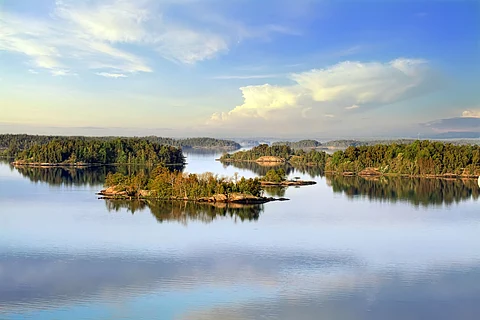

The Nämdö Archipelago, location of Sweden's new national marine park, is part of the Stockholm Archipelago (pictured), which extends 60km east from the mainland into the Baltic Sea.
Photo: Adobe Stock
Sweden is increasing protection for vulnerable marine areas in the Baltic Sea, with the decision to ban bottom trawling in marine protected areas, and to introduce the country's first marine park in the Baltic.
In June, new legislation came into force prohibiting the use of bottom trawling fishing gear in all marine protected areas, including marine parks, nature reserves, biotope protection areas and Natura 2000 sites.
The aim of the new regulation, according to an announcement by Sweden's Parliament, the Riksdag, "is to increase the protection of sensitive marine environments, even if this makes fishing in these areas more difficult."
This month, the Riksdag has also voted in favour of establishing Sweden's first marine national park in the Baltic Sea, the Nämdö Archipelago National Park in the municipality of Värmdö.
The Baltic Sea is considered one of the most polluted marine areas in the world. According to the most recent holistic report by the Baltic Marine Environment Protection Commission (HELCOM), it faces severe ongoing environmental and biodiversity impacts due to eutrophication, pollution from hazardous substances, overfishing, land-use pressures, and climate change.
At the UN Ocean Conference earlier this month, Swedish Minister for Climate and the Environment Romina Pourmokhtari highlighted Sweden's adoption of the bill "A living sea – Increased protection, reduced eutrophication and sustainable fishing".
"The Bill affirms the ecosystem approach as a fundamental guiding principle for marine policy. This approach becomes more important everyday," she stated.
"The Swedish Government is taking strong action including firm measures to combat eutrophication in the Baltic Sea. We ban bottom trawling in marine protected areas in coastal waters and expand marine protected areas to contribute to the global target of protecting 30% of the sea by 2030. Action must be taken from source-to-sea," she added.
Sweden is also preparing to ratify the High Seas Treaty, having signed the agreement in September 2023, according to an official statement released by Sweden's Ministry for Climate and Enterprise.
"The Inquiry’s proposals are now being circulated for comment. The Government will then present legislative proposals in accordance with Sweden’s legislative process. Thereafter Sweden will be able to ratify the agreement," the Ministry stated.
Sweden's action on bottom trawling follows the European Commission's recent confirmation that countries can ban destructive practices such as bottom trawling in vulnerable marine areas under European Union law.
The UK has also recently announced plans to extend the ban on bottom-towed fishing gear in protected zones, launching a consultation targeting marine and fisheries stakeholders. If approved, the measures could impact around 30,000 km², encompassing 41 Marine Protected Areas (MPAs), according to the UK Government.
